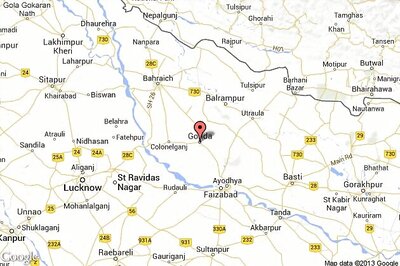
views
Few weeks into 2016, anti-India slogans allegedly raised at an event on JNU campus led to students’ union leader Kanhaiya Kumar slapped with sedition charges and lodged at Tihar.
Eight months on, he explains “his side of the story" in his autobiography.
In an exclusive interview with CNN-News18’s Bhupendra Chaubey, Kanhaiya talks about the sedition controversy and the disappearance of fellow student Najeeb Ahmed, the latest flashpoint at the varsity.
Congratulations, Kanhaiya, on your new book. Tell me, the title of your book is 'Kanhaiya Kumar, From Bihar to Tihar', you have written "exclusive memoirs". Tell me this - those who write memoirs have achieved something huge in life, they are big people, they have lots to tell. You must be a little younger than me. Why did you think of writing a memoir?
I was studying history. There was a debate in history - will it be about the king or about the people living in the kingdom? I always liked the latter thing. What Akbar wore, what he ate, who he defeated is not so important. The condition of the people is more important. I agree with you that significant people write autobiographies.
No, I understand you have experienced various things in life and you want to share it with people. But, your experience and the one in the book... So, you went to jail, the title says '...From Bihar to Tihar'. Is going to jail, getting sedition charges, all your trials - are all these your biggest achievements?
The biggest thing is, for me, going to jail, having sedition charges against me is not a unique thing. It is about the context. In this country, 80 percent of over a crore population commit their blood and life for their country, but there is no change in the situation. In his own way, when a boy from amidst them excels at cricket, media, cinema or academics, and talks about his own people, the people at the top create problems for him. Because of these problems, this boy from the village, struggles and reaches a university like the JNU and becomes its student president. He gets trapped in sedition and is repressed by the state. Why was this done?
So, your book is a medium of explaining why it all happened?
Kanhaiya: Yes, but this story is not a story of one person. It is a part of something big. I am telling you, I am not the first or the last person. The most important ruling under sedition that happened for the first time in court, that person was... They were charged with sedition. People should know there are many stories, many things. But it is important for the important thing to be told through me because my fight is not a personal fight.
Yes, I read in your book that this fight is not your personal fight. It is a difference of opinion, of thoughts. You have described where you come from, what kind of a family you come from, when you came to Delhi for the first time, when you came to JNU, when you saw autorickshaws for the first time… very well. All of this is in the book. But, I go back to the title of the book because it has been long time since you went to Tihar. There is a thing called hindsight, when you look at all the things in hindsight, do you think you made a mistake somewhere?
See, I never made a mistake. But I think I talk about it in this book that being poor in this country is the biggest crime. If you are poor, you will be made a thief easily, you will be made a criminal easily, you will be made an anti-national easily. The concept that the powerful people have of this country, your concept cannot fit into theirs. You will make your concept, you will draw your concept from the Constitution. Those who are involved in extra-constitutional affairs do not want anything to do with the Constitution.
But you were blamed as the biggest extra-constitutional authority. That "everything that is anti-India is equal to Kanhaiya Kumar". When this was all going on, why do you think it happened? You were talking about a difference of opinion. That is your right. But how did you become "anti-India"?
See, in this country there is a big conspiracy that whoever speaks against the PM is "anti-India". If anyone is speaking against the BJP, then he is against the Constitution. If anyone speaks against Sangh, then he is speaking against the history of India. On one side, this sanstha, this thought process, this position and on the other side, the Constitution, Parliament, the government, the freedom of speech, the difference, the line between these is being erased. I am speaking against the PM, not the person, I am speaking against the misuse of the position.
Be it Congress, BJP… whoever it is. You don't have anything against Narendra Modi, the thing is you have a problem with the misuse by whoever is sitting on that chair?
Yes. The promises he made before winning the elections, he hasn't fulfilled. I am speaking against that. But, the conspiracy is that if you criticise the government, you are tagged as "anti-national". Criticising the government is not being anti-national.
That is absolutely right.
The PM is not the country. The country is made of its 1.25 crore population. And there are different kinds of thought processes here. One mindset cannot be forced onto someone.
The judge that gave the order when you were granted bail, there was a big discussion on Judge Savitri. She said, "People like Kanhaiya Kumar suffer from gangrene." The word "gangrene" was used in the judgment.
I have full faith in the justice system. But, she wrote it with respect. But, we should think about the order, about what has been written. The old judges, the lawyers thought about this and said giving this kind of a judgment is not right in the history of India. The way these things have been written with motivation, the motive shows that the constitutional nature of this country is being limited.
Tell me, so much happened around you, in the media. If you look at JNU today, what is the biggest headline today? It is that your classmate, Najeeb, is missing since 16 days. The debate, the difference of opinion that went on in JNU... I hear all sorts of things. Some people say ABVP people beat him, some people say he went missing, some say he is a patient of depression. His mother came here. Where is Najeeb? Do you know?
This is a very good question that you have asked. Such a big incident has occurred that shook the nation, there were protests everywhere. It’s been nine months since. A charge sheet needs to be filed within three months. Why hasn't the police filed a charge sheet yet? What is the case? The case is that an institution that has become a symbol for protests and rebel in the country. The policies of the government, whatever it maybe, regarding that, when students come on streets, the institution that they represent, its image gets tarnished. The movement on December 16 was led by JNU. Rohith Vemula was lost during the protests. In all types of protest, it became important that the image be tarnished. The attempt was made prior to as well as after February 9. It happened prior, because a politician spoke against JNU. Then again in a letter by RSS, things were stated against JNU. After that the events of February 9 were showcased in such a way that, it made JNU seem as an institution that was built to break the nation. But today the reality has come forth. The police have nothing to say and it is clear now that this was all a conspiracy of the government. After that, mishaps can happen with women anywhere, and it happened in JNU as well.
Even you were accused of misbehaving with girls. And you were shown to be drunk, because of which you ended up misbehaving.
This is a false accusation. And it was presented in such a way that as though there is not a single good thing about JNU. And that idea of tarnishing the image of JNU was created. Amidst all of that there was the sudden disappearance of Najeeb. Even today the question stands, that if there is a person missing, is it the responsibility of the police to find him or of the students of JNU? A failure to do so, will be the failure of the Delhi Police. Secondly, if law and order is not being maintained in some institution, the failure is of the administration and the teachers.
If Najeeb is missing for 16 days, whose responsibility is it?
The responsibility is mainly of the JNU administration, because he is your student. If my mother comes to know that I am missing, the first person she will question is the Vice Chancellor, because he is responsible for us. It is the failure of the institution because, whatever incidents of violence occurred, immediately the JNU administration should have investigated the situation. There was nothing of this sort done. Up to this day it has not been done.
And why was the investigation not done?
It was not done because it was believed that the boys had a relation with the members of the ABVP and the party in power is the BJP. And our Vice Chancellor is dancing to the tunes of the government. Hence, no attempts were made.
So that means Najeeb, who has been missing, the reason behind his sudden disappearance is not becoming a matter of concern because the people who misbehaved with Najeeb, were supposedly from the ABVP?
Yes, absolutely. This is one of the main reasons. Another reason being these people are creating the narrative in such a way that after the events of February 9, the students have gone missing and the people who were behind their disappearance are the ones involved. The point is whoever may be involved, the investigation must be conducted in a transparent manner. Because what is more important is that the boy returns. For your own political benefits you cannot play around with the life of a boy.
So the investigation that is being conducted on the missing boy, you are saying, is a part of a political strategy?
There is no investigation happening. Neither by JNU nor by the police. Is it not possible to find a person within 15 days in this country? If it is not possible then it means that all our agencies have failed.
So whatever you have explained in your book, about your life and your experiences and if I was to see it in the context of the Najeeb incident, and if I say that even after the occurrence of such big incidents nothing has changed, then am I right?
The thing about change is that, we have been trying continuously as to where JNU stands. We want to bring that perspective amidst the people. So understanding what JNU is, is an integral part of this book. Who is JNU standing with… But a counter narrative against the government has also been brought up. When you search for my book, you will find that a parody has been made, by the name "Kaunhaiya Kumar" You will find that first on Amazon. Where my research topic has been re-written in such a horrible way, that there is a constant attempt to tarnish our image.
So in the end tell me, when you went to jail and you returned and during the course of this, politicians from various parties tried to contact you — Nitish Kumar, Mamata Banerjee, Rahul Gandhi et al. Can you name one such politician that you believe, setting aside the politics, who inspires you?
I do not believe in this when you make one individual your role model. Individualism influences politics, and then, what happens is the collective attitude is rejected and the individual attitude is established.
What about a party?
I think today a unity of the mindsets is needed. If you want to break the theory of one party, one state, one leader, you need a united mindset of nation of nations and a collective group of leaders. A united front needs to be created. I cannot see the creation of such a front in the ministerial politics, but this can be seen within universities, be it Hyderabad, JNU , FTII etc. And I believe that if these people come together, then instead of searching an alternative within the existing parties, a new front can act as an alternative and then maybe the existing parties can take it seriously. And then whether the media hypes or does not highlight something, they will still come and listen to us and then may be seriously contribute to our idea of nation building
Thank you so much for joining us today, and congratulations on the launch of your new book.



















Comments
0 comment